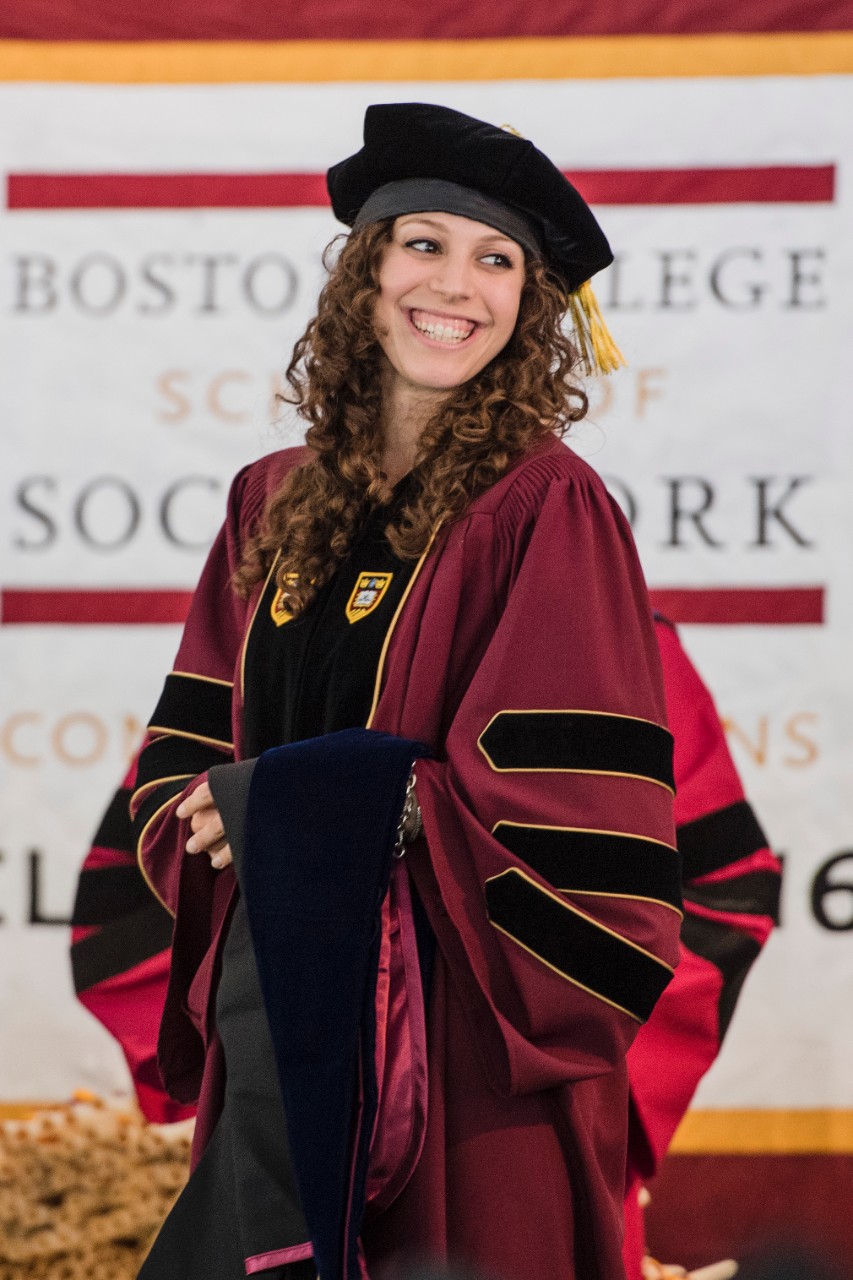
This past May, Leia Saltzman graduated with a PhD from the Boston College School of Social Work. The research for Saltzman’s dissertation, The Struggle to Grow: Reaching Constructive Post-traumatic Growth Among Veterans Exposed to Combat Related Trauma, was conducted at The Israel Center for the Treatment of Psychotrauma at Herzog Hospital in Jerusalem; Saltzman has accepted a post-doctoral fellowship to work on an extension of this research and will return to Israel this coming fall.
In this Q&A, Saltzman discusses what a BCSSW education means to her, her interest in the field of trauma, and her hopes for the year to come.
Editor's Note: Dr. Leia Saltzman is now an Assistant Professor in the School of Social Work at Tulane University.
Congratulations on your recent successful dissertation defense and graduation from BCSSW. Tell us a little bit about what your time at BC has meant to you.
Leia Saltzman: Thanks! I’ve really had a wonderful experience here, first during my MSW program, and then in pursuit of a PhD; there are so many strengths to the program. In particular, I’ve had some great mentors that have helped to train me to be an independent researcher, in terms of both theory and methodology.
I think of the mentorship I’ve received as a bread crumb trail of influences, where I can see a piece of each mentor in various stages of my work. I truly feel like I can take on any stage in the process of publishing a manuscript successfully, and this is a huge asset to my career moving forward. I’m confident in my abilities as an independent researcher now, focused on my own work, and ready to move forward in my career as an academic.
Speaking of your own work, much of your focus has been around resilience and growth in response to trauma. Your dissertation analyzed data collected by a trauma center in Jerusalem on discharged Israeli soldiers, and in particular, their various trajectories of adaptation post-service. Tell us more about your interest in this important subject.
LS: I’ve always been interested in resilience and how people can bounce back and experience growth following a traumatic experience. I also believe that the majority of people have the ability to do well in the face of trauma, and my time at BC has instilled in me a desire to find ways to explore this topic in more detail, to develop new opportunities for policy, and on the ground with the interventions we provide as social workers.
BC has also taught me the value of thinking about social issues on a global level, and I’ve been able to cultivate this interest in a part of the world where, unfortunately, trauma is central to the experience of so many.
I first visited the trauma center at Herzog Hospital in Jerusalem during a summer intensive workshop, where I established relationships that have lasted throughout my doctoral studies and dissertation writing. It’s a unique environment in a complicated place; some of the elites in trauma research are housed there, studying some of the unfortunate realities of the current world we live in.
In fact, this fall I’ll be going back to Herzog Hospital and Hebrew University’s School of Social Work and Social Welfare thanks to a post-doc fellowship from the Azrieli Foundation, although the population I’ll be studying, cancer survivors, is different from the one that I wrote about in my dissertation (The Struggle to Grow: Reaching Constructive Post-traumatic Growth Among Veterans Exposed to Combat Related Trauma), I really think the uniqueness of the trauma itself is just one piece of the puzzle that influences how individuals adapt following trauma.
Congratulations on your post-doc opportunity. What do you hope to gain during your return to Herzog Hospital and Hebrew University, and where do you expect your path may lead following this one-year placement?
LS: First and foremost, I hope to continue to contribute to the field of trauma, and to better understand positive adaptation experiences, towards developing policy and interventions to best help the greatest number of people.
I believe that research needs to be applicable and sustainable in order to be viable, and I look forward to a career of exactly this kind of inquiry – BC has helped to ingrain this necessity in my process. This next year will go a long way towards developing a more holistic understanding of just what might work for survivors of traumatic experiences, and I hope to use this growing knowledge to effect positive change into the future, for a global population.


